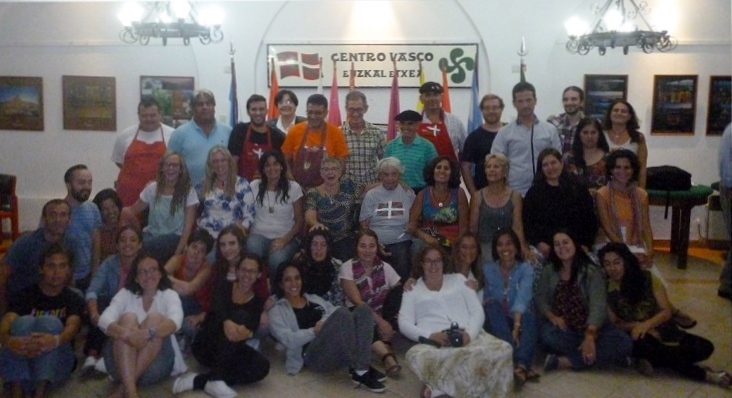basque heritage worldwide

01/28/2014

ADVERTISING
San Nicolas, Argentina. The summer Barnetegi 2014 came to a close on January 25th at noon in the city of San Nicolas. As every year, the event was a week-long with classes in the morning and afternoon, aimed at improving oral skills on the basis of what was learned online that is used throughout the year.
The Euskara Munduan program is charged with teaching Basque to those who are committed to teaching it after four years of training through online classes, two barnetegis a year as well as other support. These students will then, in turn, become professors and diffusers of Basque in their respective Basque clubs and centers.
At the end of last week and as an evaluation of the recently concluded Summer Barnetegi 2014, program director, Kinku Zinkunegi, told EuskalKultura.com that he was happy with how the students are assuming the responsibility as their future rolls as teachers. “If we review to this point, we can say that the first barnetegi (of this four-year program) that we conducted last year was above all for the students, the majority of which had no previous experience in learning Basque and who had their first contact with the language and the program in general. That one in Rosario can be considered the first barnetegi conducted on the material and work done on the online course and we should say that the students seemed a bit nervous…and pressured…Now, on the other hand, it was a great surprise to come here and see them so relaxed. I think that they have learned a lot throughout the year and they are now excited to talk and practice what they have learned even though for many it is the result of only one year. They were more relaxed in spite of the effort that they put forth to communicate only in Euskera. It is certainly very gratifying and that’s why I want to mention the transformation that this group has undergone. These students study on their own, some are very isolate and their capacity to come and implement what they have learned is worthy of mention.”
“On the other hand, with groups that have been trained previously, we could only rely on attendance to get an evaluation of their performance, not on level, so anyone who did the work was allowed to continue. From now on however, we will take their level into account as a measure of their ability to continue so anyone who cannot keep up slows down the group, and the idea is to form the most homogeneous group possible in 2016. Right now, there are 33 students in the program of which 23 came to the barnetegi and those who didn’t come, all but two, weren't able to attend but will continue and are with us in the program. So from what I have seen currently everyone in this group is able to follow and keep up and so will continue."
Teacher Training
With the barnetegi over, professors trained in previous Euskara Munduan programs were also invited to come to San Nicolas to participate in a Teachers Meeting aimed to address didactic questions, and to share experiences. Using these topics as a starting point, they also worked on carrying out joint projects between teachers and students at the clubs where they teach.
“In Argentina there is a large group of teachers and the majority of them teach classes in Basque clubs in different parts of the country. One thing for sure, we lost track of the previous Euskara Munduan group members that finished two years ago, and the one before that finished six years ago, the most of them teach in their Basque clubs, but many of them have not been seen or heard from since. The idea to get together came from FEVA and I am completely in agreement with them. I think that it is a good thing for people to continue to get together to share experiences and stay in contact. This was the first meeting and sure there will be another one in July with others that weren’t able to attend this one. I also think it would be a good idea to do it annually, after the summer barnetegi. Keeping in mind that here classes begin in March, January meetings can be very useful, not only for class planning but also to program activities among all the teachers for example, participating in the Community Lecture that takes place in June, or the International Day of Euskera festivities,” the teacher from Donostia said.

[Teachers attending the barnetegi: standing Alejandra Bengoechea, Kinku Zinkunegi, Natalia Hormazabal, Esteban Capurro, Sabrina Otegui and Paulina Lorda; seated Rocío Basterra, Nieves Castillo, Alicia Itcea, Gabriela Mendia, Alejo Conti and Mari Carmen Itcea]
In sum, before leaving San Nicolas, Zinkunegi also referred to the hosts and teaching staff in charge of giving the classes: “I want to mention the work that was done all week long by Argentinean professors Gabriel Arce, Natalia Hormazabal, Gabriela Mendia and Sabrina Otegui. I also want to show my appreciation to the Basque club in San Nicolas, its board and members welcomed up; the will and manner they have of working together. They found a solution to every problem and many times even before we were aware of it. They were in the Basque club all day long, taking care of us. They made us feel at home and were excellent organizers as well as hosts.”
ADVERTISING
ADVERTISING
ADVERTISING
ADVERTISING
ADVERTISING
© 2014 - 2019 Basque Heritage Elkartea
Bera Bera 73
20009 Donostia / San Sebastián
Tel: (+34) 943 316170
Email: info@euskalkultura.eus